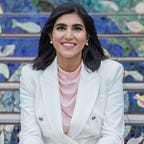Comment in Support of Upholding the Eid Resolution
This letter was submitted as Public Comment and sent directly to the SF United Board of Education Commissioners and Superintendent Wayne on September 20, 2022.
Dear SFUSD Commissioners and Superintendent Wayne,
I’m writing to you once again this evening in support of the Eid Resolution. I would like to reiterate the importance of this resolution in advancing equity, inclusiveness and representation within SFUSD. I have learned just how much these integral components, values we often associate with San Francisco, are lacking within our public education and political systems over the course of the last six weeks as I’ve spoken to different people and groups in advocating for this resolution. It has been a painful lesson and my request to you is to stay the course and do the right thing by upholding the original resolution and following through on the commitment you made publicly on August 9 by seeing this through in the 2023–2024 school year.
It should not be lost on any of us that this is an issue because it is something for the Muslim community. The reality that the Muslim community has been singled out in the process is simply a fact — and the community knows it. The fact is that the fight raging behind-the-scenes and the pressures you each are facing have motivations which have nothing to do with this resolution. For some, it’s legit Islamophobic and anti-Muslim and/or anti-Arab sentiment which I hope that you find unacceptable and will not kowtow to. For others, it’s because they feel their political ally was unfairly disparaged for their position on the issue. And the result has been going after one of the few things the Muslim community has ever asked for and advocated for from the city and county of San Francisco. This has devolved from action around equity to petty politics.
In meeting with different groups on this issue over the last six weeks, I have been struck by how internalized the racism and bigotry is in regards to this issue. I’ve heard the Muslim community and religion described as uncivilized and needing to be educated in the ways of the West for Muslims to understand how things ‘need to function.’ I’ve spoken to Muslims who practice privately and do not share their identity as Muslim because they fear being judged or labeled. I’ve met people of color completely assimilated into thinking that the white American standard of culture is the defacto worldview. I’ve met people who think this exercise of calendar inclusivity is a complete waste of time because it’s not something that is important to them. Finally, I’ve heard every single excuse in the book on why NOT to proceed with Eid or evaluating any other holidays — from how complicated it will be to factor in all communities to being able to execute this in a truly equitable way.
What was consistent across the conversations with people who did not support the resolution was one thing: they do not want change. However, the reality is that change is necessary for progress. And change is not easy — more often than not it is hard and a grueling fight. Allowing systemic bias to continue to pander to people with political and/or racist and/or xenophobic agendas will not eliminate systemic racism or create the change we all espouse to believe in. Holding the line and doing the hard work of creating change by pushing back on people with the wrong motivations will create a more equitable school system and society. And that is what I am asking you to do this evening.
We all know that we do not live in a truly integrated society and that is painfully apparent in our public schools and educational outcomes. There are many divisions along the lines of race, socioeconomics, religion, etc. — the list goes on and is often intersectional. Although many people pay lip service to inclusivity and diversity, truly practicing these principles is hard work. And who suffers? In this case, the students. A 2021 CAIR study found that a majority of Muslim students in CA public schools do not feel safe in schools. Although recognizing Eid and finding a path forward for this resolution is just one way to uplift Muslim students, it is something meaningful that the community has asked for and organized around. The statistics are clear — more needs to be done. This is only the beginning.
Racial integration of public schools was once considered a radical idea. It was an idea that faced a lot of backlash and many people advocated against it for a multitude of reasons — some openly racist and others cloaked in other reasons but with racism as the main driver. But integration was the right thing to do.
Tonight and moving forward, I ask you all to do the right thing. It may seem like we have come a long way, but you and I know we have much farther to go.
Sincerely,
Nadia Rahman
